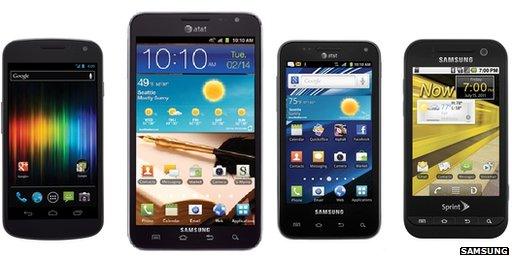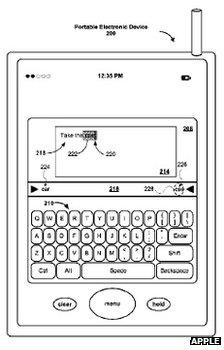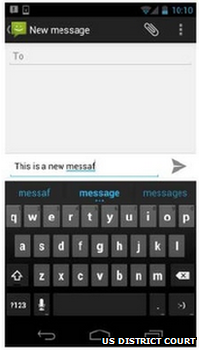Samsung 'infringed' Apple's auto-complete text patent
- Published

Apple alleges that several Samsung handsets infringe its auto-complete patent
A US judge has ruled that Samsung infringed Apple's patent-protected word recommendation technology.
The invention, external describes a way for touchscreen devices to suggest completed words after a user has part-typed them to speed up text input.
Experts say the ruling could have implications for other Android devices that offer the facility.
The judgement comes ahead of a trial in which both firms plan to claim the other copied several of their features.

Apple included this drawing in its 2007 patent filing
Judge Lucy Koh - who presided over a previous dispute between the two companies in 2012 - also denied Samsung the opportunity to claim Apple had infringed one of its synchronisation technologies on the basis that the South Korean firm was not the first to register the idea.
This means that when the case comes to court on March 31, Apple is set to allege five cases of patent infringement - one of which has already been secured - and Samsung will claim four cases.
News of the decision was first reported, external by patent consultant Florian Mueller, who has published the summary judgement in full, external.
Rejected argument
Apple's auto-complete patent was first filed in January 2007, days before Steve Jobs unveiled the firm's first iPhone.
It noted that the size of existing mobile phones made typing difficult and suggested offering the auto-complete function via a graphical user interface as a solution.
Samsung later claimed that the patent applied only to handsets and tablets that included physical keyboards.
However, Judge Koh rejected this argument, noting that Apple's invention had specifically described the feature being accessed via a touchscreen virtual keyboard.
"We are disappointed by the court's decision, and look forward to the jury trial, when the jury is expected to consider the claims related to the remaining summary judgment requests that were denied," said a spokesman for Samsung, referring to the fact the judge had rejected Apple's request that other claims be dismissed.
The iPhone-maker has not commented on the decision.
'Not earth-shattering'
Apple contends that several Samsung products infringe its technology, including the Galaxy Nexus handset and early versions of the Galaxy Note phablet.
The ruling means it can now seek to have these blocked from sale.
But one expert said the judgement could also have wider ramifications.

The ruling included this image of a Samsung device's user interface
"This judgement has the potential to affect any mobile company that uses auto-complete functionality," said Vicki Salmon, a member of the UK's Chartered Institute of Patent Attorneys.
"That could include more recent Samsung devices, but it will depend whether the same methodology is being used."
Another patent lawyer added that the ruling was not as "earth-shattering" as it might first seem.
"This doesn't completely preclude there being other versions of auto-complete," said Andrew Alton from Urquhart-Dykes & Lord.
"For example, they could still use the keyboard rather than part of the screen to enter instructions. However, this would probably be less elegant."
The ruling may affect the negotiating stance taken by the firms at mediation talks.
Apple's chief executive Tim Cook is due to meet his counterpart at Samsung Electronics, Oh-Hyun Kwon, by February 19 to discuss "settlement opportunities".
- Published22 November 2013
- Published12 November 2013
- Published20 August 2013